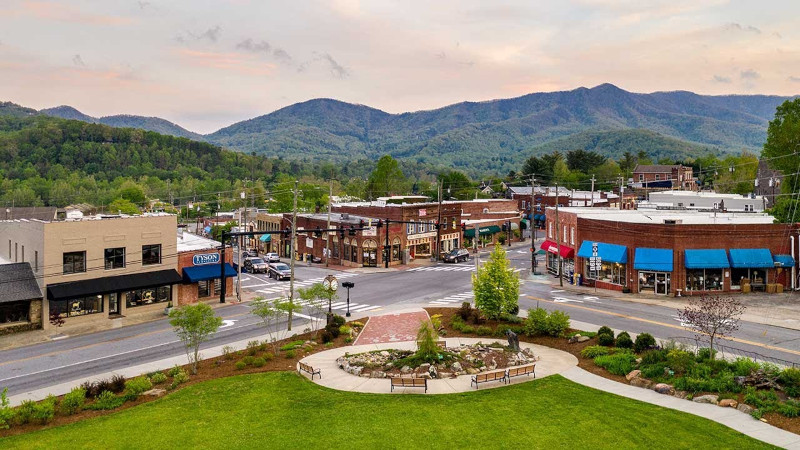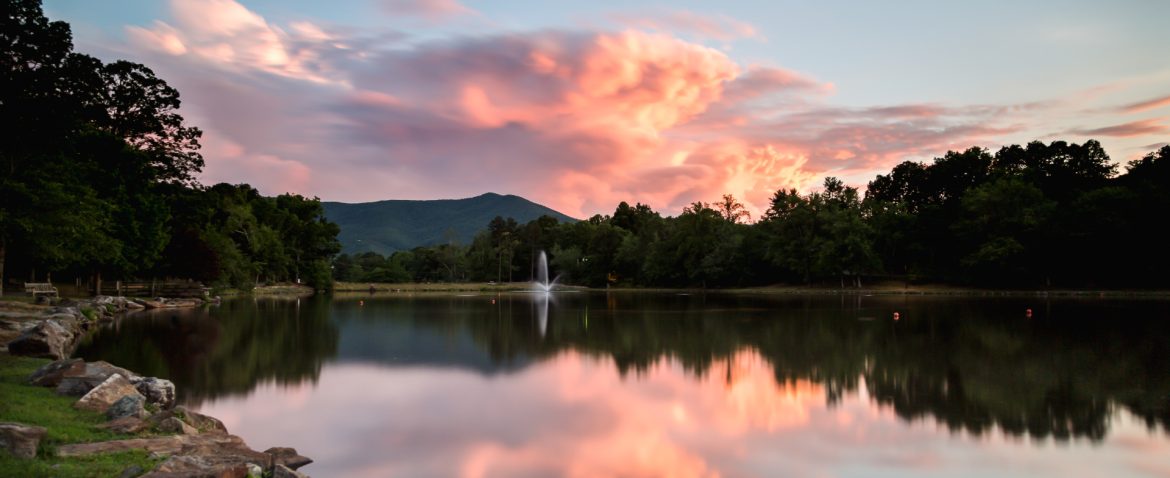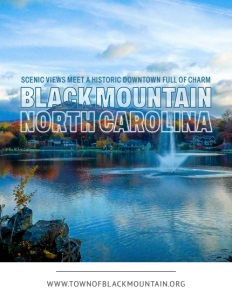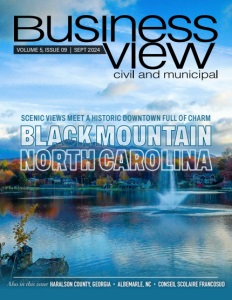Black Mountain, North Carolina
Scenic Views meet a Historic Downtown Full of Charm
A Vibrant Blend of Economy, Tourism, and Community Development in Buncombe County
Black Mountain, founded in 1893 and named after the nearby Black Mountain range, is a community of 8,500, known for its scenic views, historic downtown, and welcoming neighborhoods.
“We are the first town as you come up into Buncombe County off of Interstate 40,” describes Town Manager Josh Harrold. “We sit in a valley, surrounded by mountains. Black Mountain is a picturesque and beautiful place.” Tourism is a cornerstone of the town’s economy, where the scenery, outdoor amenities, quaint downtown shops, restaurants, and lively arts scene draw visitors from near and far.
Recreation Destination
As a haven for outdoor enthusiasts, the town has recently completed an outdoor recreational plan. The goal is to promote Black Mountain as a destination for activities such as mountain biking in Pisgah National Forest, trout fishing in nearby streams, and exploring the many hiking opportunities in the area.
“We want to make Black Mountain the home base where you stay, relax, and restore at the end of the day. We are working on this idea that we’re not the day trip from Asheville anymore, we are the destination for these folks,” depicts Assistant Town Manager Jessica Trotman. This strategy focuses on supporting local businesses tied to the outdoor economy, such as outfitters and bike shops, strengthening community relationships, and marketing the town to a broader group.
“Black Mountain has enjoyed a significant organic tourism growth over the years. We want to be more intentional about certain market sectors that we bring into our community, to enjoy not just eating here, but also staying here and enjoying all the fun things to do around us,” she says.
Black Mountain participates in initiatives such as the Mountain Heritage Trout Waters Program, offering public access to fishing along the Swannanoa River. “We are trying to leverage our resources with our publicly accessible waterways, our local communities that relate to that, as well as our parks and recreation department who offer programming,” maintains Trotman.
“We’re trying to bring together these different resources in a more organized way. We want to make it more attractive for businesses to be here and people to visit.”

Connecting Communities
Recently, a feasibility study was completed for an area known as the Ridgecrest Connector, a nearly mile-long segment that will be designated as part of the Fonta Flora State Trail. “That trail embraces a model of being out in rural areas and then into small towns,” describes Trotman.
We’re seeking grant money right now to pay for the engineering. That will connect from our existing bike and ped network, which is the East-West spine through downtown, taking it to the east town limits. That will be a critical connection, both for Fonta Flora and for the residents who live in that area.”
Harrold highlights that this project is part of a larger regional effort, noting, “This goes through three or four counties and a lot of municipalities along the way. A lot of work has been done in Burke County around Lake James, and it’s starting to head west now. Old Fort is starting to pick up some trails, and of course, Black Mountain, as well. I think it’s important to talk about it on a regional level because you’re able to get more done when you’ve got more people involved.”
Black Mountain is also working on plans to develop 50 acres which were recently donated to the town. “About half of it has to be kept as open space, park space, passive recreation types of things,” Trotman expands, noting that the rest, while not deed-restricted, has some challenges with accessibility from interstates, railroads, and floodplains. A feasibility study is underway in partnership with Equinox Environmental, to identify community needs. This will be followed by a master planning process.
“We do have a good idea that those 24 acres will be leveraged both for the community and for tourism. Things like hiking, mountain biking, those are relatively low cost to develop, but bring a lot of people and bring a lot of benefits,” she says, emphasizing that this plan will enable residents and tourists to enjoy an extensive system of trails within the town limits, rather than needing to venture outside Black Mountain for such activities.
Economic Development, Infrastructure and Workforce Initiatives
The upcoming opening of the North Carolina Glass Center in downtown Black Mountain is expected to attract around thousands of visitors annually to its state of the art glass studios, stimulating economic growth on the eastern edge of the community.
Trotman recounts, “The Glass Center is going to be a really big deal. They have an existing location in the River Arts district in Asheville with 47,000 visitors a year. This location is larger, with furnaces, studios, and gallery space with the ability to expand classes and community outreach.”
Harrold shares the promising future of Commerce Park, a business hub in the center of the town. “We have an interchange coming off of Interstate 40 that will be right beside this business park, and that construction starts next year,” he relays. “There’s a big opportunity with this Commerce Park to take off once the access is there for them. So, we are working with the Economic Development Coalition of Buncombe/Asheville, trying to market some of that site.” $2 million in grant funding has already facilitated the installation of a new access road and essential utilities such as water and sewer lines. “So, we’re ready. We’re just waiting for that business now,” Harrold asserts.
Relying on a well based water system, the Town of Black Mountain has taken steps to ensure a sustainable water supply for its residents and future developments. Harrold explains, “Those wells are not enough to provide the water that we need. So, about five years ago, we got into an agreement with the city of Asheville. Now we can buy more water from them, which of course supplements ours. Having that and being able to show developers that we’ve got the water that they may need, is crucial.”
In addition, collaborations with firms like McGill Engineering, Headwaters Engineering, and Wildlands Engineering have facilitated significant progress in stormwater management, environmental restoration, and water system improvements. The Town has also initiated a $5 million flood benching project led by North State Environmental and Kimley-Horn.
On the education side, Montreat College, a private four-year institution, is preparing to break ground on a new cybersecurity campus in Black Mountain in the spring of 2025. “It presents a unique opportunity for the region to develop a cybersecurity workforce,” acknowledges Trotman.
It’s going to be bringing a different demographic to town, professionals from all over, for conferences, training events, boot camps, as well as students. So, there’s the potential for these folks who are having training here, or students who are graduating from this program, to bring more tech sector-based small businesses to the area.”

Creating Diverse Housing
The housing market in Buncombe County is one of the most expensive in North Carolina, with a median cost that exceeds $400,000. Currently, Black Mountain consists of single-family homes, with limited multifamily options. “We haven’t slowed down at all. People are building, just like they were two years ago,” Harrold maintains.
“When it comes to housing shortages and affordability, we struggle with that, like everybody else. People aren’t going to build affordable housing when they can build expensive housing and make money. That’s what we struggle with here, is finding someone who has that passion to do affordable housing.” Competitive funding mechanisms and a lack of available property further exacerbate the situation.
To address these challenges, Trotman says Black Mountain is revising its development regulations, and the state has adjusted building code regulations to reduce the cost of constructing multifamily units up to five plexes. She emphasizes the need for partnerships and collaborations to create more affordable housing opportunities, including potential collaborations with Buncombe County and existing housing trusts.
Shaping the Future
Looking ahead, Harrold says significant focus remains on the upcoming interchange project which is expected to unlock new economic opportunities for Black Mountain. Additionally, the renovation of an old park, which will breathe new life into a community greenspace, and the strategic planning for the 50 acres of donated property will be top of mind.
Trotman adds that several large-scale projects, including the flood bench, bike and pedestrian initiatives, and a substantial stream restoration effort, are set to progress, along with the development of Black Mountain’s first sustainability plan.
Poised for continued growth and success, the Town of Black Mountain has much to offer, both as a place to visit, and a place to call home.
AT A GLANCE
Black Mountain, North Carolina
What: A historic community, with vibrant amenities for residents and visitors.
Where: Buncombe County, North Carolina
Website: www.townofblackmountain.org
PREFERRED VENDORS
Petronella Cybersecurity and Digital Forensics – https://petronellatech.com
Petronella Technology Group, Inc. (PTG), established in 2002, provides digital forensics, cybersecurity consulting, training, pen testing, and security risk assessments. Leveraging certifications like CJIS, CMMC, and HIPAA, PTG ensures clients exceed security and compliance standards with custom-built solutions. Visit: https://ptgcyber.com



